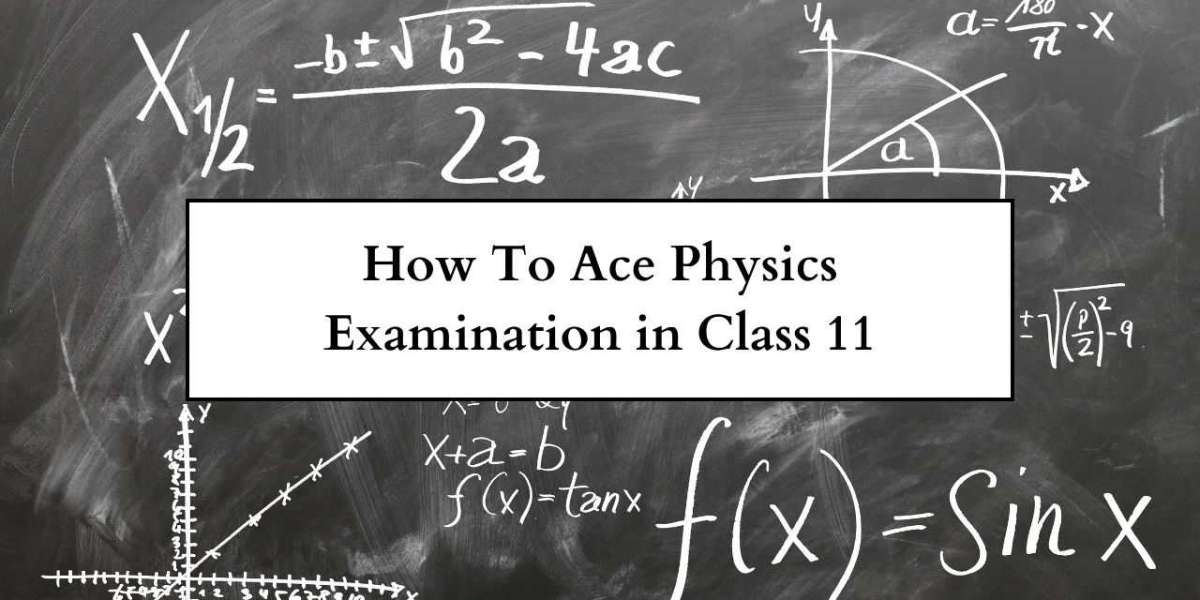Physics is one of the most challenging subjects that students face in their academic life. The concepts are complex and require a deep understanding of mathematics and theoretical principles. For Class 11 students, the physics exam is a crucial test that determines their academic progress. It is essential to prepare for the exam thoroughly to score good grades. In this article, we will discuss the tips and tricks to ace the physics examination in Class 11.
Understand the Syllabus
The first step towards acing any examination is to understand the syllabus thoroughly. In Class 11, the physics syllabus covers topics like Units and Measurements, Kinematics, Laws of Motion, Work, Energy, and Power, etc. Students must go through the syllabus carefully and make a list of all the topics that they need to study. It is important to understand the weightage of each topic to allocate the appropriate time for each.
Understanding the syllabus is crucial for success in any academic course. Here are some tips for understanding the syllabus:
- Read through the syllabus carefully: Take the time to carefully read through the syllabus, paying attention to the course objectives, assignments, due dates, grading criteria, and any policies or guidelines.
- Ask questions: If there’s anything you don’t understand or are unclear about, don’t hesitate to ask your teacher or professor for clarification.
- Make note of important information: Write down key information, such as important due dates, assignments, and exam dates. You can use this information to create a study plan and ensure that you stay on track throughout the course.
- Review the syllabus regularly: Don’t just read the syllabus once and forget about it. Make sure to review it regularly throughout the course, so that you can stay up to date on any changes or updates.
By taking the time to understand the syllabus, you can ensure that you’re well-prepared for the course and have a clear roadmap for success.
Prepare a Study Plan
Once you have understood the syllabus, it is time to prepare a study plan. A well-planned study routine will help you cover all the topics and revise them before the exam. Allocate more time for the difficult topics and less time for the easy ones. Students should make a timetable that includes all the subjects and set achievable goals.
Preparing a study plan can be incredibly helpful for a number of reasons:
- Time management: A study plan can help you allocate your time effectively, so that you can make the most of your study sessions and avoid wasting time.
- Organization: By creating a plan, you can organize your materials, assignments, and study sessions in a way that makes sense to you.
- Prioritization: A study plan can help you prioritize your tasks based on their importance or deadline, so that you can focus on what’s most important and stay on track.
- Goal setting: By setting goals and milestones in your study plan, you can track your progress and feel a sense of accomplishment as you achieve them.
- Reduced stress: Having a plan in place can help reduce stress by providing structure and clarity to your study sessions, and ensuring that you’re well-prepared for exams or assignments.
Overall, a study plan can help you stay organized, focused, and on track towards achieving your academic or personal goals.
Study the Textbook
The textbook is the primary source of information for any subject. Students should study the physics textbook thoroughly and make notes of the important concepts. The textbook includes solved examples and practice problems that will help the students understand the concepts better. It is important to solve all the exercises and practice problems to get a good grip on the subject.
Studying the textbook is a crucial part of academic learning. Here are some tips for effectively studying your textbook:
- Skim the chapter: Before you start reading the chapter, take a few minutes to skim through it. Look at the headings, subheadings, and any bolded or italicized text. This can give you an idea of what the chapter is about and help you focus your reading.
- Take notes: As you read through the chapter, take notes on key concepts, definitions, and examples. This can help you remember the material and organize your thoughts.
- Summarize the chapter: Once you’ve finished reading the chapter, try summarizing it in your own words. This can help solidify your understanding of the material and identify any areas where you may need further review.
- Review regularly: Don’t just read the chapter once and forget about it. Make sure to review the material regularly, so that you can retain the information and build upon your knowledge over time.
- Practice with questions: Many textbooks include practice questions at the end of each chapter. Use these questions to test your understanding of the material and identify any areas where you may need more practice.
By studying your textbook effectively, you can deepen your understanding of the material and improve your academic performance.
Use Supplementary Study Material
Apart from the textbook, students can also use supplementary study material to enhance their understanding of the subject. There are many books and online resources available that provide additional information and practice problems. Students can also watch educational videos and attend online lectures to get a better understanding of the concepts.
Using supplementary study material can be incredibly helpful for a number of reasons:
- Reinforcement of concepts: Supplemental materials can reinforce concepts covered in lectures or the main textbook, helping you to solidify your understanding of the material.
- Alternative perspectives: Different resources can provide different perspectives on the same topic, which can deepen your understanding and help you see the topic from different angles.
- Exposure to different teaching styles: Supplemental materials may be presented in different formats or by different teachers or authors, giving you exposure to a variety of teaching styles.
- Additional practice: Supplemental materials may provide additional practice problems, quizzes, or activities to help you reinforce what you’ve learned.
- Enrichment: Supplemental materials may cover topics not covered in the main textbook or lecture, helping you to broaden your knowledge and deepen your understanding of the subject.
Overall, using supplementary study material can enhance your learning experience, deepen your understanding of the material, and improve your academic performance.
Solve Previous Year Papers
One of the best ways to prepare for the physics examination is to solve previous year papers. Solving papers will give students an idea about the exam pattern, marking scheme, and difficulty level of the questions. It is recommended to solve at least 5-10 years of previous year papers to get a good idea about the exam.
Solving previous year papers can be an incredibly effective way to prepare for exams. Here are some reasons why:
- Familiarity with exam format: By solving previous year papers, you can become familiar with the format of the exam, including the types of questions asked and the time constraints.
- Identifying patterns: Solving previous year papers can help you identify patterns in the types of questions asked and the areas of the subject that are emphasized. This can help you focus your studying and prepare more effectively.
- Practice: By solving previous year papers, you can get practice with the types of questions you’re likely to see on the exam. This can help you build confidence and improve your performance on exam day.
- Assessing your strengths and weaknesses: As you solve previous year papers, you can identify areas where you’re strong and areas where you need more practice. This can help you focus your studying and address any weaknesses before the exam.
- Improving time management: Solving previous year papers can help you improve your time management skills by practicing how to allocate your time effectively during the exam.
Overall, solving previous year papers can be a valuable tool for exam preparation, helping you build confidence, identify areas for improvement, and improve your overall performance on the exam.
Practice Numerical Problems
Physics involves a lot of numerical problems that require mathematical calculations. Students should practice solving numerical problems to get a good grip on the subject. They should understand the formulae and units used in the problems and practice solving them step by step.
Revise Regularly
Revision is an essential part of exam preparation. Students should revise the topics regularly to retain them in their memory. It is recommended to revise the topics within 24 hours of studying them. Students can make flashcards or revision notes to revise the topics quickly.
Regular revision is an essential part of effective learning. Here are some reasons why revising regularly is important:
- Retention: Regular revision helps you retain the material you’ve learned, so that you don’t forget it over time. By revisiting the material at regular intervals, you can reinforce your understanding and improve your long-term retention.
- Identifying gaps in knowledge: Regular revision can help you identify areas where you may have gaps in your knowledge or understanding. This can help you focus your studying and address any weaknesses before they become bigger problems.
- Confidence: By revising regularly, you can build your confidence in your knowledge and abilities. This can help you feel more prepared for exams and assignments, and reduce anxiety and stress.
- Improved performance: Regular revision can improve your overall performance in the subject, as you’ll be better equipped to tackle new material and apply what you’ve learned to new situations.
- Better time management: Regular revision can help you manage your time more effectively, as you’ll be able to study more efficiently and avoid cramming before exams.
- Overall, regular revision is an essential part of effective learning, helping you retain knowledge, identify gaps in understanding, build confidence, improve performance, and manage your time more effectively.
HC Verma Solutions
HC Verma Solution Class 11 is a set of study materials developed by renowned Physics professor Harish Chandra Verma. It provides comprehensive solutions for the questions given in the textbook Concepts of Physics Part 1 for Class 11 students. The solutions are easy to understand and follow a step-by-step approach, making them ideal for students who want to develop a strong foundation in Physics.
Stay Calm and Confident
On the day of the exam, students should stay calm and confident. They should read the instructions carefully and manage their time efficiently. It is important to attempt all the questions and avoid silly mistakes.
Seek Help
If students face any difficulty in understanding the concepts, they should seek help from their teachers or tutors. It is better to clear the doubts in the initial stage rather than waiting for the last moment.
FAQs
What are the important topics to study for the physics examination in Class 11?
The Class 11 physics syllabus covers a wide range of topics. Some of the important topics that students should study are Units and Measurements, Kinematics, Laws of Motion, Work, Energy, and Power, Rotational Motion, Gravitation, Thermodynamics, Oscillations, Waves, etc. Students should go through the syllabus carefully and prepare a study plan that covers all the topics.
How many hours should I devote to physics?
The number of hours required to study physics may vary from student to student. However, on an average, students should devote at least 2-3 hours daily to physics. It is important to have a consistent study routine and cover all the topics thoroughly.
How can I improve my problem-solving skills in physics?
The best way to improve problem-solving skills in physics is to practice solving numerical problems. Students should understand the concepts and formulae used in the problems and practice solving them step by step. They can also seek help from their teachers or tutors if they face any difficulty in understanding the problems.
Is it necessary to solve previous year papers for the physics examination in Class 11?
Yes, it is highly recommended to solve previous year papers for the physics examination in Class 11. Solving papers will give students an idea about the exam pattern, marking scheme, and difficulty level of the questions. It will also help them identify their strengths and weaknesses and focus on the areas that need improvement.
What should I do if I am unable to understand a concept in physics?
If you are unable to understand a concept in physics, you should seek help from your teachers or tutors. You can also refer to supplementary study material like books and online resources to enhance your understanding of the concept. It is important to clear the doubts in the initial stage rather than waiting for the last moment.
Conclusion
Physics is a subject that requires regular practice and deep understanding. Students should follow a disciplined study routine and cover all the topics thoroughly. Solving previous year papers and numerical problems will help them get a good grip on the subject. By following the above tips and tricks, students can ace the physics examination in Class 11.








